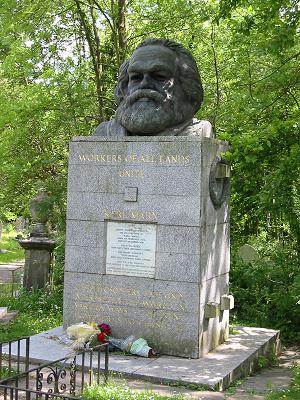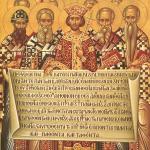I have touched on this theme before in terms of Pope Benedict XVI’s appreciation o f the depth and insight of Karl Marx’s intellect. Throughout his socio-political writings, the Pope exhibits at once a fascination with and a repugnance toward Marxism. He is measured in his critique of Marxist ideology, preserving those few fragments that are true while rejecting those elements contrary to an authentic anthropology. I want to draw attention to one such element, central to Marxism as a system for social restoration, which Benedict XVI acknowledges to be perhaps its most severe weakness, namely, its false promise of hope.
f the depth and insight of Karl Marx’s intellect. Throughout his socio-political writings, the Pope exhibits at once a fascination with and a repugnance toward Marxism. He is measured in his critique of Marxist ideology, preserving those few fragments that are true while rejecting those elements contrary to an authentic anthropology. I want to draw attention to one such element, central to Marxism as a system for social restoration, which Benedict XVI acknowledges to be perhaps its most severe weakness, namely, its false promise of hope.
That Marxism is dead is no secret. Sure, there are regimes throughout the world that continue to pose as heirs to Marxism (e.g., North Vietnam, China, Cuba), but these vestibules of an expired ideology and outworn banners do no more than to remind us that the spirit of Marxism has long been vanquished–not by economic wars, but because of the very scaffold of the ideology itself. Marxism rose and fell according to the evidential quality of the hope it sought to inculcate among those souls who wed themselves to its promises. And, quite frankly, that hope was in vain.
The Marxists themselves admit as much. Consider Ronald Aronson, a self-proclaimed Marxist who has reflected deeply on the demise of the system. His honest and stimulating work, After Marxism, Aronson candidly relates:
Marxism is over, and we are on our own.
As Marxism’s last generation, we have been assigned by history the unenviable task of burying it.
When I say that Marxism is over today, then, I mean it is over in precisely this sense as a project of historical transformation. I cannot object if some people want to continue propounding and studying the theory, as philosophy or political economy, or employing it, as societal analysis, as philosophical critique of capitalism, or using any other of its fragments. They may even want to call themselves Marxists when they do so, but they must undrstand that they are no longer Marxists in the original sense of being partisans of, and allied to, a Marxist project of social transformation. All such theoretical Marxisms are, in fact, post-Marxisms that refuse to admit it…in whatever ways its many fragments may live on, Marxism is over.
Whatever reasons Marxists may give for the death of their project, I tend to agree with Pope Benedict XVI’s opinion that it was its unfulfilled promises that lend to its sudden demise. Marxism promised to heal the four alienations of man (from nature, from work, from others, from himself) caused by the industrial movements of the eighteenth and nineteenth centuries by means of a historically unfolding project of class elimination, equitable distribution of wealth, and socializing the means of production. Pope Benedict XVI describes the advent of Marx’s influence and effect:
After the bourgeois revolution of 1789, the time had come for a new, proletarian revolution: progress could not simply continue in small, linear steps. A revolutionary leap was needed. Karl Marx took up the rallying call, and applied his incisive language and intellect to the task of launching this major new and, as he thought, definitive step in history towards salvation—towards what Kant had described as the “Kingdom of God.” Once the truth of the hereafter had been rejected, it would then be a question of establishing the truth of the here and now. The critique of Heaven is transformed into the critique of earth, the critique of theology into the critique of politics. Progress towards the better, towards the definitively good world, no longer comes simply from science but from politics—from a scientifically conceived politics that recognizes the structure of history and society and thus points out the road towards revolution, towards all-encompassing change. With great precision, albeit with a certain onesided bias, Marx described the situation of his time, and with great analytical skill he spelled out the paths leading to revolution—and not only theoretically: by means of the Communist Party that came into being from the Communist Manifesto of 1848, he set it in motion. His promise, owing to the acuteness of his analysis and his clear indication of the means for radical change, was and still remains an endless source of fascination. (Spe Salvi, 20)
But the elements Marx held out as objects of hope could not be attained. The means of attaining them, over which Marx remained reticent, were unclear and, ultimately, impossible. In place of this absence came the totalitarian regimes that forcibly and violently sought to uproot and replace the modern political and economic structures at the cost, ironically, of human nature itself. The Pope outlines:
Together with the victory of the revolution, though, Marx’s fundamental error also became evident. He showed precisely how to overthrow the existing order, but he did not say how matters should proceed thereafter. He simply presumed that with the expropriation of the ruling class, with the fall of political power and the socialization of means of production, the new Jerusalem would be realized. Then, indeed, all contradictions would be resolved, man and the world would finally sort themselves out. Then everything would be able to proceed by itself along the right path, because everything would belong to everyone and all would desire the best for one another. Thus, having accomplished the revolution, Lenin must have realized that the writings of the master gave no indication as to how to proceed. True, Marx had spoken of the interim phase of the dictatorship of the proletariat as a necessity which in time would automatically become redundant. This “intermediate phase” we know all too well, and we also know how it then developed, not ushering in a perfect world, but leaving behind a trail of appalling destruction. (Spe Salvi, 21)
Historically, the attempt to implement the Marxist programmatic has been met by wild tragedy and unceasing failure. In 1990, Pope Benedict XVI (Joseph Ratzinger) pointed to the empirical face of Marxism as evidence of its intrinsic flaws:
“[O]ne can and must say simply that Marxism failed as an all-embracing interpretation of reality and as a directive for action in history. Its promise of freedom, equality and welfare for all was not verified by the empirical facts; it was shown to be false on the basis of political and economic facts.” (“Paths of the Revolutionary Change of the Present Day” in Turning Point for Europe?, 82).
The Pope reiterates this empirical and historical face of Marxist violence in 1992, when he claimed that “under the rule of Marxist parties, a number of risks to man took the form of concrete political forces that were destroying the human quality of life…” (“Freedom, Law, and the Good” in Values in a Time of Upheaval, 47)
But simply because an ideology has not historically or empirically realized itself does not of necessity mean that it is a flawed system. The Pope pressed the question further, asking whether or not Marxism is inherently flawed (and what I mean in the present context by “inherently flawed” is fundamentally inhuman). While there is much to appreciate in terms of what Marx got right in terms of the human person’s alienation, there is much more to reject in terms of who the human person is to Marx and what he envisions the human person, in community, ought to be. According to Pope Benedict XVI, the error lies in the root of Marx’s conception of human nature:
He forgot that man always remains man. He forgot man and he forgot man’s freedom. He forgot that freedom always remains also freedom for evil. He thought that once the economy had been put right, everything would automatically be put right. His real error is materialism: man, in fact, is not merely the product of economic conditions, and it is not possible to redeem him purely from the outside by creating a favourable economic environment. (Ibid.)
This passage, which highlights Marx’s implicit rejection of human freedom, compliments and completes his earlier assertion that one can judge the merit of Marxist ideology according to its historical record. In his reduction of human function to political and economic activity, Marx anticipated a perfect kingdom as the outcome of the leveling of societal inequality.
A final thought: Is it still possible to be a Marxist? With a few corrections to the theory in light of Christian revelation, can we wrap Marxism with a Catholic mantel? Can a purified Marxism work? If I am reading the Pope correctly, his answer is unequivocally negative. The heart of Marxism is dark, and if we stay faithful to Marx’s original plan, we cannot separate the theory from the practice. Pope Benedict XVI explains himself well in his Preface to the 2000 edition of his magnificent Introduction to Christianity:
Now Marx appeared to be the great guidebook. He was said to be playing now the role that had fallen to Aristotle in the thirteenth century; the latter’s pre-Christian (that is, “pagan”) philosophy had to be baptized, in order to bring faith and reason into the proper relation to each other. But anyone who accepts Marx (in whatever neo-Marxist variation he may choose) as the representative of worldly reason not only accepts a philosophy, a vision of the origin and meaning of existence, but also and especially adopts a practical program. For this “philosophy” is essentially a “praxis”, which does not presuppose a “truth” but rather creates one. Anyone who makes Marx the philosophy of theology adopts the primacy of politics and economics, which now become the real powers that can bring about salvation (and, if misused, can wreck havoc). (“Preface to the New Edition” in Introduction to Chrsitianity, 14-15).
It seems that the Pope’s message is clear. On account of the inner logic of Marxism–and not because of any arbitrary rule of the magisterium–one cannot be a Catholic and a Marxist. Aside from a kernal or two of truth in Marx’s thought (and these the Pope has noted), Marxism and its remainders tell a lie about the truth of humanity in its deepest spiritual and social reality. Fortunately, lest any Catholic feel tempted to give himself or herself over to the seduction of Marx (and those who have studied Marx are familiar with the sweetness of that seduction), the real Marxists remind us: Marxism is over.
















